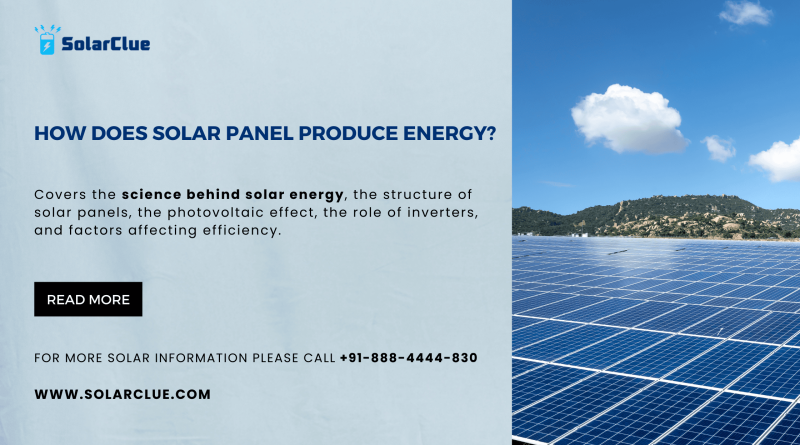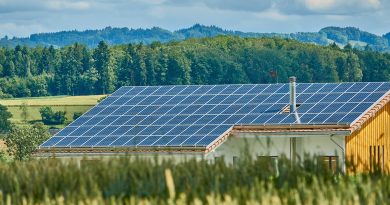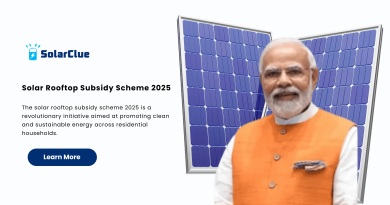How Does Solar Panel Produce Energy?
Solar energy is a rapidly growing renewable energy source, offering a sustainable alternative to fossil fuels. Understanding how solar panels generate electricity is essential for appreciating their potential and effectiveness. This blog covers the science behind solar energy, the structure of solar panels, the photovoltaic effect, the role of inverters, and factors affecting efficiency.
Table of Contents
- 1 The Science Behind Solar Energy
- 1.1 The Structure of a Solar Panel
- 1.2 The Photovoltaic Effect in Detail
- 1.3 DC to AC Conversion: The Role of Inverters
- 1.4 Factors Affecting Solar Panel Efficiency
- 1.5 The Impact of Sunlight Intensity and Temperature on Energy Output
- 1.6 Common Misconceptions About Solar Power
- 1.7 The Future of Solar Panel Technology
- 1.8 Conclusion
- 1.9 FAQs
The Science Behind Solar Energy
Solar energy originates from the sun, which emits solar radiation. This energy can be captured and converted into usable electricity using solar panels. The process involves transforming sunlight into electrical energy through the photovoltaic effect, which is the fundamental principle behind solar power.
The Structure of a Solar Panel
A solar panel consists of several key components that work together to capture sunlight and convert it into electricity:
Solar Cells
Solar cells are the building blocks of solar panels. They are made of semiconductor materials, typically silicon, which absorb sunlight and generate electrical energy through the photovoltaic effect.
Junction Boxes
The junction box is located on the back of the solar panel and houses the electrical connections and diodes. It ensures the safe transfer of electrical current from the panel to the inverter.
Backsheets
The backsheet is the outermost layer on the back of the solar panel, providing protection and insulation for the internal components. It helps prevent moisture and environmental damage.
The Photovoltaic Effect in Detail
The photovoltaic effect is the process by which solar cells convert sunlight into electricity. When sunlight hits the semiconductor material in a solar cell, it excites electrons, freeing them from their atoms. This movement of electrons creates an electric current. Solar cells have electric fields that direct these free electrons, generating a flow of electricity that can be harnessed for power.
DC to AC Conversion: The Role of Inverters
Difference Between DC and AC Electricity
Solar panels generate direct current (DC) electricity, where the electric charge flows in one direction. However, most household appliances and the electrical grid use alternating current (AC) electricity, where the electric charge periodically reverses direction.
Importance of Inverters
Inverters are essential components of solar power systems, converting DC electricity from solar panels into AC electricity for use in homes and businesses. There are different types of inverters:
- String Inverters: Connect multiple solar panels in a series and convert the combined DC output into AC.
- Microinverters: Installed on individual solar panels, converting DC to AC at the panel level.
- Power Optimizers: Work with string inverters, optimizing the performance of each panel and converting DC to DC before the string inverter converts it to AC.
Factors Affecting Solar Panel Efficiency
Several factors influence the efficiency of solar panels:
Quality of Solar Cells
Higher quality solar cells typically have better efficiency and longer lifespans.
Installation Angle and Orientation
Proper installation angle and orientation towards the sun maximize sunlight exposure and energy production.
Shading and Obstructions
Shading from trees, buildings, or other obstructions can significantly reduce the efficiency of solar panels.
The Impact of Sunlight Intensity and Temperature on Energy Output
Sunlight Intensity
The amount of sunlight a solar panel receives directly impacts its power generation. More sunlight means more energy produced.
Temperature
Higher temperatures can decrease the efficiency of solar panels. While they need sunlight to generate power, excessive heat can reduce their performance.
Common Misconceptions About Solar Power
Myth: Solar Panels Don’t Work in Cloudy or Cold Climates
Solar panels can still generate electricity in cloudy or cold conditions, although their efficiency may be reduced compared to sunny conditions.
Myth: Solar Energy is Too Expensive
The cost of solar panels has decreased significantly over the years, making solar energy more affordable and accessible.
Myth: Solar Panels Require a Lot of Maintenance
Solar panels require minimal maintenance, mainly periodic cleaning and inspections to ensure optimal performance.
The Future of Solar Panel Technology
Advancements in solar technology continue to improve efficiency, reduce costs, and expand applications. Emerging technologies such as bifacial panels, perovskite solar cells, and solar skins offer promising developments that could revolutionize the solar industry.
Conclusion
Understanding how solar panels generate electricity involves grasping the science behind solar energy, the structure of solar panels, and the photovoltaic effect. Proper installation, maintenance, and technological advancements play crucial roles in maximizing the efficiency and benefits of solar power systems. Solar energy is a sustainable and increasingly affordable option for meeting global energy needs.
Here at SolarClue®, we offer a smart, practical, and “beautiful” solution. You will be answered for all the questions related to Solar.
We provide all kinds of brands that are the Best Solar panels in India.
If you are the one who is planning for the solar power system. Don’t hesitate to contact our team!
Looking forward to empowering you with solar energy, just like hundreds of our other clients!
FAQs
1. What is the photovoltaic effect?
The photovoltaic effect is the process by which solar cells convert sunlight into electricity, involving the excitation of electrons in a semiconductor material.
2. What are the main components of a solar panel?
The main components include solar cells, junction boxes, and backsheets.
3. How do inverters work in a solar power system?
Inverters convert the direct current (DC) electricity produced by solar panels into alternating current (AC) electricity used by household appliances and the electrical grid.
4. What factors affect the efficiency of solar panels?
Factors include the quality of solar cells, installation angle and orientation, and shading from obstructions.
5. Do solar panels work in cloudy or cold climates?
Yes, solar panels can still generate electricity in cloudy or cold conditions, although their efficiency may be reduced compared to sunny conditions.




